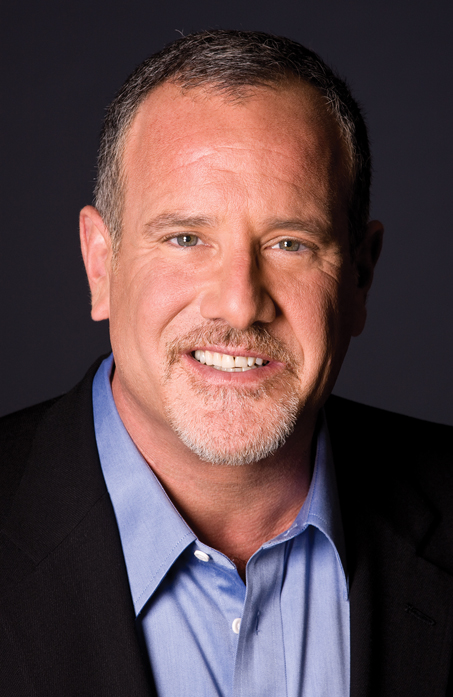
Howard’s End

He’s one of Hollywood’s most powerful publicists. Now, he might just need a PR guy himself
by Steven Foster
Whenever a celebrity has a meltdown, there is one man the broadcast entertainment wags go running to for a sophisticated soundbite or a scathing send-up. Whether it’s behind the desk at Good Morning America, Showbiz Tonight, or one of the countless other televised rags, the physically imposing but impishly witty Howard Bragman provides the gossipy talking heads with so many juicy tidbits and promo-ready quips that it’s surprising they haven’t blacklisted his appearances for making the mannequin hosts look like the cardboard cutouts they actually are.
It isn’t surprising, then, that Bragman has extended himself beyond his usual slate of go-to guest star appearances. For now, Bragman is hosting his own Internet show, propped up by the brains behind the gay cable network Logo. Once you get past the weak production values—seriously, your nerdy nephew’s comic vlog is shot better, though recent episodes have been sporting more polish—and the horrible name Gwissues (which even Bragman admits sounds like you just stepped in something unpleasant), the show, barely out of the web’s insanely
productive womb, is making its parent very proud.
Surprisingly nimble on its feet,
Gwissues has successfully danced around several hot-button topics with an impressive variety of talking tango partners. A political peer review scrutinized Obama’s upcoming second term with power players like David Mixner and Bill Clinton strategist Richard Socarides. Oscar fluff and dishy secrets came courtesy of Bruce Vilanch. Eschewing mere grave-gawking, Bragman addressed the suicide of porn star Arpad Miklos with unexpected sensitivity and grace. Out lesbian country and western singer Chely Wright broke the news that she and her partner are pregnant with twins. Chaz Bono candidly discussed both weight loss and the heavy price of fame. Even missteps like the eyerolling, snoopy speculation that Internet dating rube Manti Te’o may or may not be gay was quickly redeemed by a frank discussion of the inevitability of a major sports star coming out while still in uniform. Content may be king, but a yummy lineup doesn’t hurt.
“We’ve got some amazing guests coming up,” says Bragman with a humility rare for someone used to pimping out clients and projects for the press. “RuPaul, Cheyenne Jackson, Sandra Bernhard. Whoopi Goldberg has agreed to come on. I’m pretty excited.”
But a slate like this seems natural for someone who’s been inside the Hollywood machine for so long that the only place to eventually end up is under the spotlight that he is usually aiming on others.
Bragman/Nyman/Cafarelli was one of the entertainment industry’s powerhouses before PR firms were actually talked about in the press with the same fervor as their celebrity clients. BNC repped the likes of Cameron Diaz and Kate Hudson until it was eventually bought for millions by international PR firm Weber Shandwick. Bragman eventually authored a book, took to the talk-show circuit as a resident expert, and opened the boutique PR firm 15 Minutes. Whether by divine guidance or design, that firm became widely noted for its handling of the then-delicate topic of coming out, among other gay-centric issues. Bragman famously took on Grey’s Anatomy star Isaiah Washington as a client after Washington’s explosive dustup with gay castmate TR Knight. Bragman fiercely stands by that decision to this day, in spite of the heat he took for it.
“I’ll never apologize for that,” Bragman freely admits. “I’ve passed on a lot of clients. But when someone has genuinely screwed up and there’s remorse behind it, true regret for mistakes made, that’s something that I can support.”
It’s always open to debate whether zeal or publicity spin-doctoring is the true motivation behind any PR flack’s actions. But what’s not debatable is how the need for damage control is even greater in the Internet age. That’s why firms like Reputation.com (where Bragman is vice chairman) are springing up with more urgency than airbags around Amanda Bynes. The public may only see the mugshots and believe the rumors over factual response, but no matter the case, Bragman has been up-close-and-personal with the victims—often in tears over their well-publicized dramas—whether they are innocent or doomed by having hands obviously caught in the cookie jar.
But the Internet has brought an everlasting toxicity to such episodes, now that we’ve all gone digital. The bodies don’t decompose. The ghosts don’t die. Your mistakes are unkillable zombies, haunting and stalking you forever.
“There’s a salaciousness now that’s dangerous,” Bragman correctly points out. “We used to talk about crisis control. Now we talk about crisis management.”
And there’s a subtle but powerful difference between the two. Years ago, you could control it, shape it, hide it, deflect it, or just simply outlive it. No longer. Your past is your present. And it can destroy your future. Which is why Bragman has become the de facto sermonizer on the subject, whether pointing out the wrong way to manage a crisis or, in occasional bursts of altruism, counseling the masses on how to do it right. Gwissues gives him that forum to evangelize, although he freely admits he might not have the slick hucksterism and glowing sincerity of a Joel Osteen, or the intellectual journalistic heft of a Ted Koppel.
“I think I’m getting better,” Bragman muses. “But after being a guest contributor all these years, I really wanted people to know that I was more than just this talking head. In the beginning, we took a couple of hits. But it’s all good right now.”
It’s this lack of PR sheen that gives Bragman a genuineness, an absence of obvious spin, that would probably drive him nuts if one of his clients spoke this openly about flaws and slip-ups. And while it’s true that doctors often make the worst patients, this kind of honesty certainly makes them more relatable to the rest of us.
Steven Foster is a frequent contributor to OutSmart magazine.











Comments